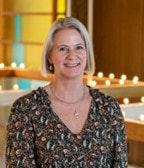|
Rev. Lara Cowtan, Minister of Congregational Care and Beloved Community Staff Team member  It had been almost twenty years since I had lived in Canada when I returned in 2019. In my absence, a new territory had been created, Nunavut (official language is Inuit), and what were once called the Queen Charlotte Islands had formally been renamed Haida Gwaii, in recognition of the Haida people who live there (official language is Haida). Special holidays had been created and awareness of native history, culture and tradition was growing. Land acknowledgement statements were commonplace at the beginning of any kind of public gathering. The Truth and Reconciliation Commission of Canada (2008 to 2015) brought about some major changes in laws, policies, and public awareness pertaining to Indigenous rights, equity, and inclusion. In 2014, the Canadian Unitarian Council (CUC) and Unitarian Universalist Ministers of Canada (UUMOC) issued a statement to the Truth and Reconciliation Commission. In it is a commitment to assemble and promote educational materials for congregations on the history and impact of the Indian residential school system, and to uphold the recommendations of the United Nations Declaration on the Rights of Indigenous Peoples. General public awareness about racism and oppression seemed to be on the rise, especially as immigrant communities from African and Asian nations grew, as did racially-motivated violent crime. Following the death of George Floyd in May 2020, the CUC issued a statement mourning the deaths of people of color, and hosted a series of conversations, workshops and roundtables to discuss and begin work to address systemic racism. A Dismantling Racism Study Group was formed, tasked with interviewing, assessing, and making recommendations to the CUC. We were all immersed in learning about the long history of anti-black racism and discrimination in Canada. Recommendations from the group are being implemented, including investment of resources at the national and congregational level, and creating/assembling antiracism material for education and worship for congregations. Then, in May 2021, the horrific discovery of the remains of 215 children buried in unmarked graves at the site of a former residential school in Kamloops, British Columbia shocked the nation. My heart broke wide open and joined with Indigenous communities as the news rolled through in a firestorm of grieving. This was just the beginning of a series of similar discoveries from other sites of some of the 140 Indian Residential Schools which operated across Canada from 1831 into the closing decades of the 20th Century. I was, at the time, serving as interim minister in Vancouver, British Columbia. There are three distinct tribes who have lived on the land where the city of Vancouver sprawls along the coast: the Musqueam, Squamish and Tseil-Watuth First Nations. Every worship service began with an acknowledgment of being uninvited residents on their land and of our responsibility to work to dismantle the ongoing impact of settler colonialism. Following the discovery, the acknowledgment went deeper to lift up the generational trauma of the victims and families of survivors of the residential school system, and the work of the congregation to be in good relationship with the areas native communities also deepened. Each year, September 30 marks the National Day for Truth and Reconciliation, an important step in reconciliation, and Orange Shirt Day, an Indigenous-led public commemoration of the tragic and painful history and ongoing impacts of residential schools. Approximately 150,000 Indigenous children were forcibly removed from their families, placed in residential schools, stripped of their culture, language and identities, their names changed, and hair shorn. They were forbidden to speak their own languages, suffered horrific abuses and poor conditions, and several thousand died. I was never taught a single thing about residential schools when I was in school. In the wake of this upswell of awareness, engagement, and response to the tireless work of leaders across Canada, on Saturday, November 27, 2021, 95% of the 104 Canadian Unitarian Universalist delegates to a special meeting of the CUC voted in favor of the motion to approve adding an 8th Principle to the current Seven Principles (bit.ly/cuc7prin) with language modified to the Canadian context. It reads:
Truth, healing and reconciliation, dismantling racism and oppressive systems of colonial and white supremacy is a long and deeply spiritual process of self-awareness and relationship-building. I am committed to the work of dismantling racism and systemic barriers to full inclusion in myself, in our congregations and in society at large. May we all continue to learn, grow heal, and live into the dream of beloved community.
0 Comments
Leave a Reply. |
Topics
All
Beloved Community ResourcesUnity Justice Database
Team Dynamics House of Intersectionality Anti-Racism Resources in the Unity Libraries Collection Creative Writers of Color in Unity Libraries The History of Race Relations and Unity Church, 1850-2005 Archives
July 2024
Beloved Community Staff TeamThe Beloved Community Staff Team (BCST) strengthens and coordinates Unity’s antiracism and multicultural work, and provides opportunities for congregants and the church to grow into greater intercultural competency. We help the congregation ground itself in the understanding of antiracism and multiculturalism as a core part of faith formation. We support Unity’s efforts to expand our collective capacity to imagine and build the Beloved Community. Here, we share the stories of this journey — the struggles, the questions, and the collaborations — both at Unity and in the wider world.
The current members of the Beloved Community Staff Team include Rev. Kathleen Rolenz, Rev. KP Hong, Rev. Lara Cowtan, Drew Danielson, Laura Park, Lia Rivamonte and Angela Wilcox. |